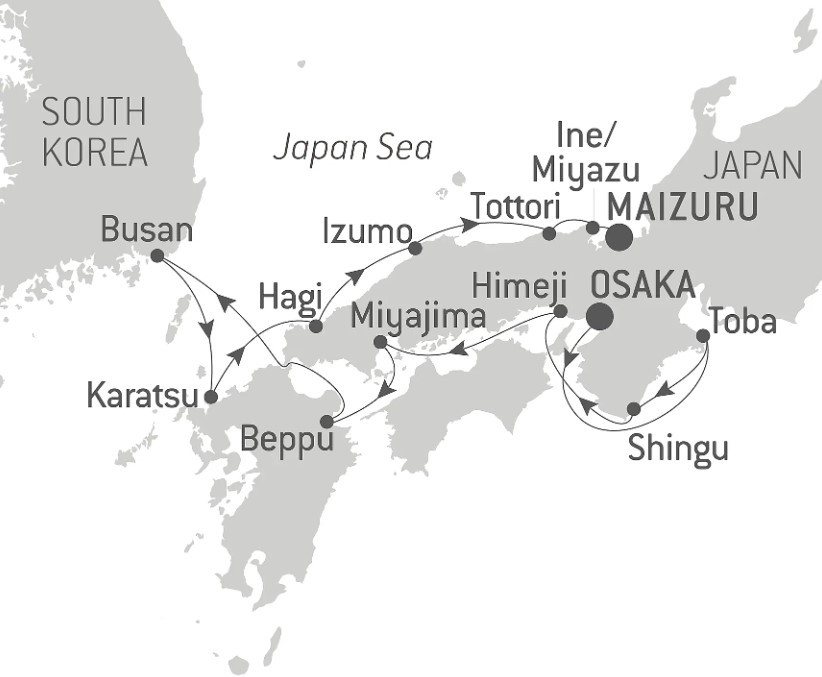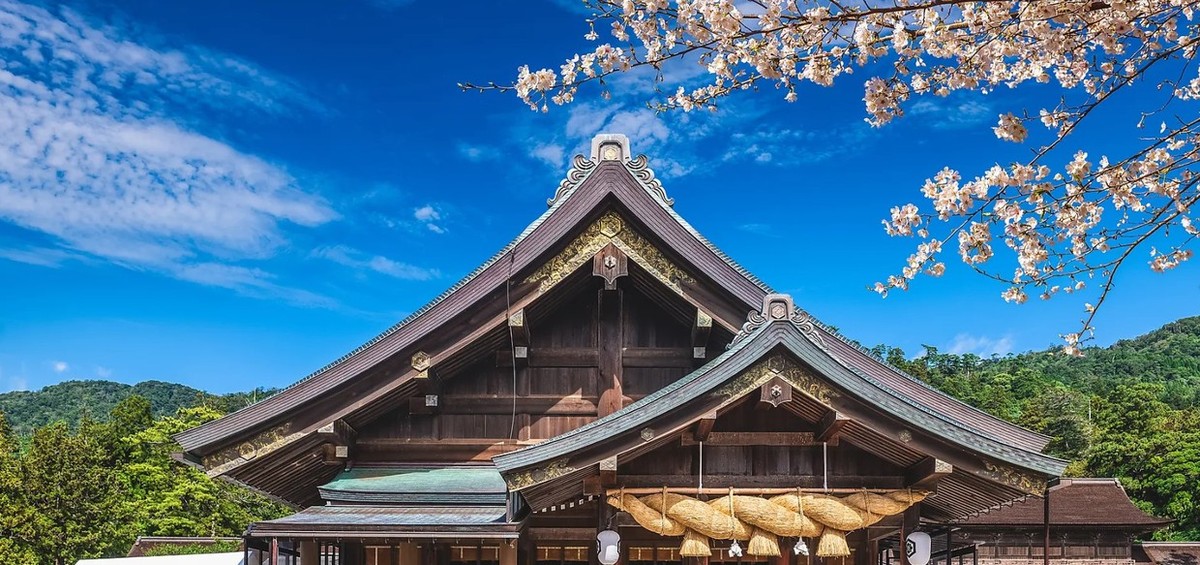
With this brand-new itinerary, PONANT invites you aboard Le Soléal for a unique expedition cruise between Osaka and Maizuru. A 13-day escapade discovering a traditional Japan shaped by age-old traditions, natural wonders and mythical legendary sites.
Throughout your journey, you will benefit from an excursion included per person per port of call, to choose from a selection offered by PONANT. During this cruise, visit Himeji’s emblematic castle, a UNESCO World Heritage Site, admire the Itsukushima Shrine from the island of Miyajima, and discover the fortified town of Hagi, also a UNESCO World Heritage Site. The diversity of experiences on offer promises you intense and varied moments (to discover the full range of excursions, go to the itinerary tab).
At the whim of the trade winds in the Sea of Japan, Le Soléal will sail towards the southern tip of the island of Kyushu. The gateway to the enchanting Ise Bay and its sumptuous ria coast, Toba invites you to enjoy a unique moment in this historic city, residence of the Imperial family. Among other things, you will have the opportunity to admire the most important Shinto shrine in Japan, Ise-jingu. In Shingu, walk the ancient pilgrimage routes of Kumano Kodō, registered as a UNESCO World Heritage Site, connecting several religious sites nestling in tropical nature.
After a unique port of call in the historic city of Himeji,the jagged coastlines of the captivating Miyajima Island come into view. The vermillion Torii gate of the emblematic Shinto Shrine of Itsukushima, a UNESCO World Heritage Site, unfolds before you in a lush forest setting. Further south, Beppu, famous across the archipelago for its hot volcanic springs, invites you to discover its green and peaceful valley, home to almost 60 stone buddhas, carved into the cliffside between the 12th and 14th centuries.
Then you will sail to South Korea, a small peninsula that juts out into the Sea of Japan, and discover Busan, South Korea’s second city. A place of great contrasts, Busan offers a spectacular view over its port, as well as over the ancient district of Chalgachi.
After you explore the charming feudal city of Karatsu, Le Soléal will continue its crossing of the Seto Inland Sea to drop anchor on the island of Honshu, in Hagi. This town will win you over with its narrow streets, traditional houses, and the former residences of Japanese warriors from this feudal town, whose mythical Shizuki Castle, erected in the 17th century, emerges as a symbol. Further north, Izumo emerges before you. Here, discover Izumo Taisha, one of Japan’s most emblematic shrines, dedicated to the kami Okuninushi-no-Mikoto, god of medicine, agriculture and commerce.
Then, the port of call in Tottori will seem like the unexpected interlude of your cruise. With good reason, since this ancient, fortified town is home to Japan’s largest sand dunes. Bright sunshine, ochre dunes edged by the Sea of Japan, camels with a captivating gait... Here, in this majestic landscape where wind waves rise to caress the sand giants, time seems to stand still. Along the shores of the Prefecture of Kyoto, you will be swept away by the picturesque towns that populate it. Ine with its old-world authenticity, Miyazu with its enchanting bay: they offer a unique and stunning experience.
In your journey’s final port of call, you will disembark in the charming city of Maizuru.
- A brand-new cruise to discover the Empire of the Rising Sun, its ancient traditions, its cultural heritage and its emblematic sites.
- UNESCO World Heritage Sites: the feudal city of Hagi, the Miyajima shrine, the ancient pilgrimage routes of Kumano Kodō, and Himeji Castle.
- All-new ports of call at Toba and Izumo, historic towns with rich Shinto heritage.
- The possibility of visiting three of the most emblematic Japanese shrines: Ise-jingu from Toba, the Shrine of Itsukushima from Miyajima, and Izumo Taisha from Izumo.
- Ine and Miyazu, old fishing villages with yesteryear authenticity.
- Make the most of an excursion included per person per port of call during your cruise thanks to the selection made by our destination experts.
Prices quoted here are often dependent on currency fluctuations. Please check with (01432 507450 or info@small-cruise-ships.com) for the very latest price, which may well be cheaper than the one advertised here.
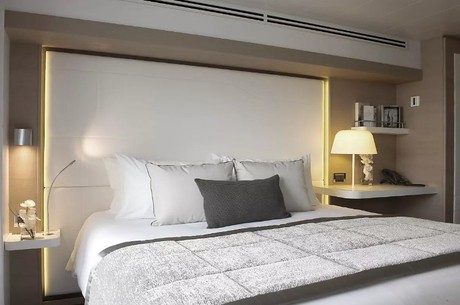
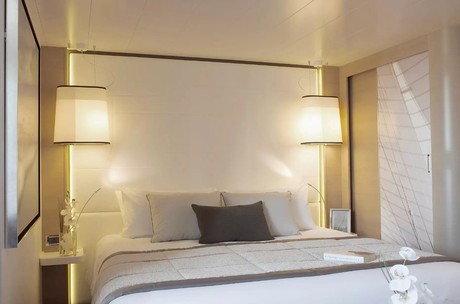
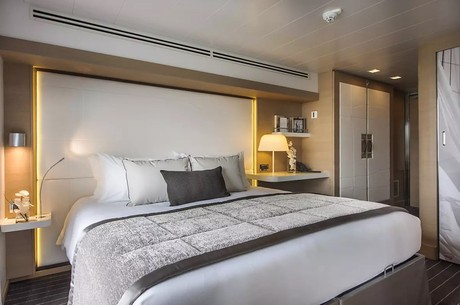
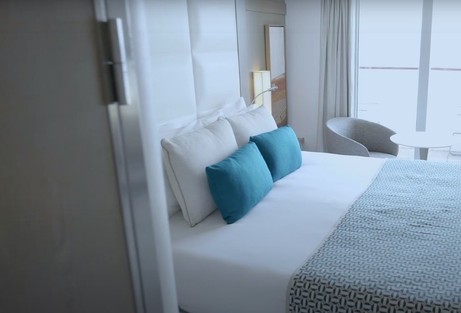
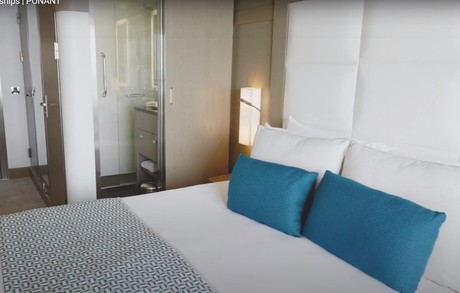
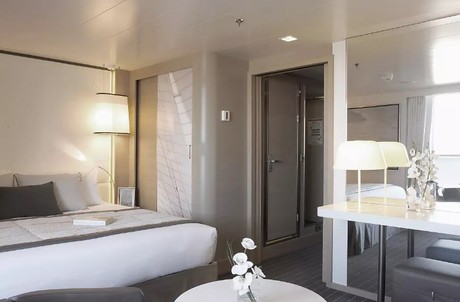
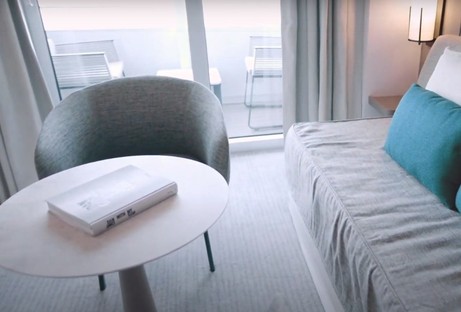
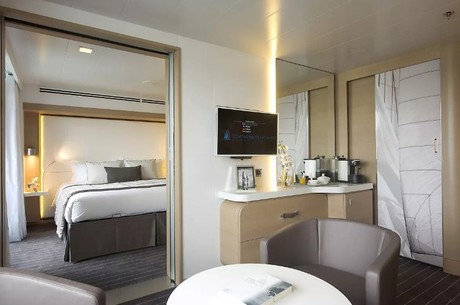
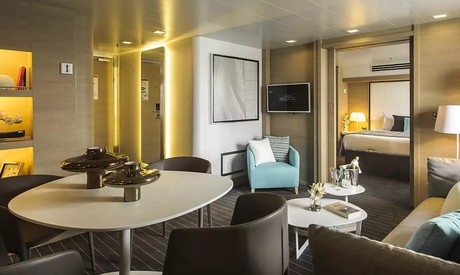
Like its big sister Tokyo, Osaka is the product of ancestral traditions and amazing technological innovations. And despite its size, its location on the Pacific Ocean give it a sense of serenity. The main historic landmark is the 16th century Osaka Castle, which stands proud in the midst of majestic skyscrapers. The lively streets of Dotomburi and the bizarre Shinsekai district attract thousands of locals and visitors. A multitude of restaurants offer menus full of regional specialities: takoyaki, made with octopus, and other succulent dishes such as kushikatsu kebabs.
Toba is a coastal city located in Japan’s Mie Prefecture, on the shores of the Pacific Ocean. Situated in the Ise-Shima National Park, Toba has given its name to majestic bay sheltering a string of small islands, famous for the beauty of their forests and the production of cultured pearls. You will have the possibility of discovering the Ise Shrine, residence of the Imperial family and venerated by the Japanese people as the “soul of Japan”.
To the south-west of the Japanese archipelago, Shingu is a port town in the Kansai region. Founded in 1933, it belongs to the peninsula of Kii, the countryメs largest. Take a trip around the Kumano Sanzan religious complex dedicated to three sacred mountains and home to two Shinto temples, Kumano Hong? Taisha and Kumano Hayatama Taisha.ᅠThe latter features the famous sacred nagi tree, said to have been planted around 1159. Pilgrims flock to these two sanctuaries that feature on UNESCO's World Heritage list. Hop on a boat and journey to the Dorokyo Gorge, a natural beauty spot carved out by the emerald waters of the Kumano river.
You may get the impression that youメve already seen Himeji Castle, as it has been featured many times on the big screen. The feudal edifice seems to spread its wings over the town like a white heron ヨᅠ in fact, its nickname is モthe castle of the white heronヤ. Originally started in the 15th century and then rebuilt in the 17th-century, it is a UNESCO World Heritage site. At its feet lies the gorgeous Koko-en garden, which has nine different gardens designed to flourish in each of the four seasons.
At the heart of the Inland Sea, Miyajima, the “island sanctuary” will reveal its treasures. In the background you will see the Shinto Grand Sanctuary, whose entrance is guarded by a magnificent vermillion “Torii“. Considered to be one of the most beautiful sites in the Japanese islands, you will be transported by the unique character and the serenity of this sacred site.
A favourite destination for the Japanese, Beppu is now famous throughout the Japanese archipelago thanks to its onsen – volcanic hot springs in which people immerse themselves to relax with family or friends. From Beppu, you will set off to discover a lush, peaceful valley in which sit 60 majestic stone Buddhas carved out of the cliff face between the 12th and 14th centuries. Exuding a soothing air of serenity, the Mangetsuji site seems to have drifted off to sleep in the heart of a dense bamboo forest surrounded by rice fields. Recognised as a National Treasure of Japan, this set of sacred sculptures offers travellers a unique, wonderful experience.
With around four million inhabitants, Busan is the second largest metropolis on South Korea, after Seoul. This dynamic harbour city, located in the south-east, surrounded by the warm waters of the Sea of Japan, benefits from a mild, pleasant climate. You’ll find delightful simply to stroll around the lively streets and explore the city’s outstanding cultural heritage of art galleries, museums, and Buddhist sites, such as the Haedong Yonggungsa temple, which elegantly sits on the waterfront. Rich too in magnificent beaches and superlative natural landscapes, Busan’s peaceful atmosphere will win you over, as will its inhabitants, whom you’ll have the pleasure of meeting.
Karatsu Bay is edged with long sandy beaches and a huge pine forest that was planted over 350 years ago to protect the coast from the winds and tides of the Genkai Sea. From the top of the donjon of Karatsu Castle or Mount Kagami, you will be able to admire magnificent panoramas. In the north of the Higashi-Matsuura Peninsula, the waves have eroded the lava plateau and carved a magnificent natural site, the seven Nanatsugama Caves, out of the basalt. The city of Karatsu is famous for the quality of its pottery, which is influenced by the craftsmanship of nearby Korea. Very fine pieces are displayed in the city’s galleries and at Karatsu Castle, alongside magnificent samurai armour.
In the south of Honshu island, surrounded by mountains, Hagi is a city of water. For good reason; it was built on the delta of the Abu-gawa river. Its castle was built in the 17th century and its outer walls remain in the lovely Shizuki Park. The old town was one of the cradles of the Meiji revolution. You will discover its rich past in streets lined with old houses and samurai manors, or within the walls of the many museums and Hagi-yaki ceramics workshops.
Disembarking at Izumo, dive into mythical Japan, that of legends and gods. The city is home to one of the oldest and most important shrines in Japan, the “Izumo Taisha”, considered as the cradle of the spiritual history of the Land of the Rising Sun. In Izumo, you will discover traditional Japanese life, between paddy fields, temples, hot springs and beaches. There are many traditional inns and artisanal boutiques, bearing witness to a typical and ancestral local culture. You will perhaps taste the local speciality, Izumo Soba, noodles made from buckwheat flour…
On the San-in coast, Tottori, the Japanese island of Honshu’s northernmost city, offers tranquillity and a change of scenery. Lined with lush forests containing mountain sanctuaries long considered to have been the homes of the gods, Tottori has retained its authenticity of yesteryear. A symbol of Japan off the beaten track, this city in the eponymous region promises to be a surprising interlude on your cruise. With good reason, since this ancient fortified city with vestiges of its past is home to the largest sand dunes in Japan. Bright sunshine, golden dunes edged by the Sea of Japan, camels with a captivating gait... Here, in this majestic landscape where wind waves rise to caress the sand giants, time seems to stand still.
In the north of the Kyoto prefecture, along the Sea of Japan and anchored in the Bay of Ine, this small fishing village nestling between lush green mountains and emerald waters is considered to be one of Japan’s most beautiful villages. Calm and picturesque, Ine has successfully preserved its authenticity of yesteryear, as evidenced by the Funaya, these traditional wooden dwellings built above the water to house fishermen and store their small boats. Ine will take you on a beguiling voyage into the 18th century, to the epoch of Edo and the Kitamae trade route.
In Kyoto Prefecture, along the coast of the Sea of Japan, lies the charming city of Miyazu. As you explore this interesting blend of lush nature and rich heritage, you will be captivated by the numerous places of worship that dot the town, such as the Manai Shrine and Nariai-ji Temple. You will also discover one of the “Three Views of Japan”, the country’s most beautiful panoramas: Amanohashidate, a sand bar covered with 8,000 pine trees, lying between the Asokai Inland Sea and Miyazu Bay. It is known as the “bridge to heaven” and legend has it that this sand bank is a ladder that fell out of the sky and was once used by the gods Izanagi and Izanami to ascend into the clouds.
Located on the western coast of Honshu island, in the province of Kyoto, the charming town of Maizuru boasts one of Japan’s most exquisite closed bays. A climb to the observatory allows to appreciate the splendour of this inlet scattered with tiny wild islands. Visitors can also admire the treasures of traditional architecture by visiting the temple of Enryu-ji or the Tanabe-jo castle. The town also bears traces of a rich military past, which you can see in the old arsenals of the navy, red brick buildings that today house a museum.
Itineraries are subject to change.
Le Soleal

| Length | 142 metres |
|---|---|
| Launched | 2013 |
| Crew | 140 |
Luxury Small Ship
A sleek silhouette, a welcoming intimate atmosphere, and the same philosophy that has made her sister ships, L'Austral, Lyrial and Le Boreal, such a success.
This magnificent yacht of only 132 staterooms and suites, all with balconies, has contemporary decor inspired by the luxury yachting world, with fluid lines and a modern colour scheme combining natural wood with shades of grey and white. White Corian counters in the lobby contrast with the warmth of leather to recall a boat's hull, while the central scuplture of enamelled pieces takes its inspiration from the sea. In the lounge bar, the carpet picks up a tennis stripe theme symbolising a certain idea of cruising, one synonomous with French elegance and a chic seaside spirit.
Wheelchairs
3 specially adapted wheelchair cabins (Deck 3 = Superior cabin no. 307, no balcony, Deck 4 = Prestige Cabin no. 407 - with balcony and Deck 5 = Prestige Cabin no 509, with balcony) and lifts to all decks/areas.
Read about our recent Ponant cruise to Antarctica
Please click the following links to read more about Ponant and the other Ponant cruise ships.
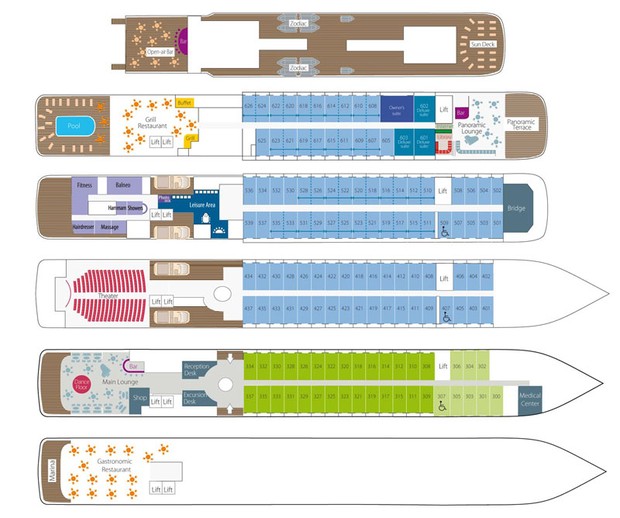
Includes
- accommodation in stateroom,
- the full meal plan,
- the Open Bar: beginning with boarding, and during the duration of the cruise, a wide selection of drinks (mineral water, soft drinks, wine, beer, Charles Heidsieck champagne, spirits, coffee, tea) is served on request and at any time of the day. Certain premium alcoholic beverages on the menu are not included in the Open Bar,
- free Wi-Fi internet access 24 hours a day*,
- access to all the common areas:
- fitness room, steam room, hair salon, swimming pool (sea water, heated), solarium, lounges, theater, boutique & leisure area.

